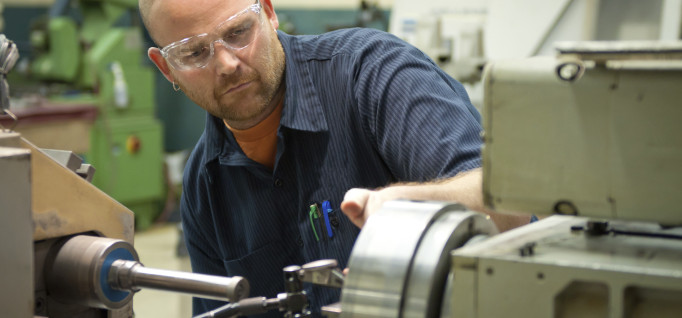N.C. Colleges Create Collaborative for Global Commerce Hub
By Reyna Gobel
March 3, 2015
Community colleges pool resources to put forth the most skilled workers.
North Carolina, once home to a traditional economy based on tobacco, furniture and textiles, is stepping up its game and preparing to become a regional hot spot for a new global economy, requiring new kinds of workers — and community colleges are teaming up to help.
To keep pace with the need for skilled workers in factories, manufacturing and logistics, more than a dozen colleges in the Charlotte, North Carolina, area are sharing faculty, resources and facilities.
How the collaborative works
Companies or government entities, such as the local economic development commission, contact the nearest community college about training needs. If one college doesn’t have the faculty, equipment or training space, it contacts a partner college that can offer the missing component. Colleges share the revenue that tuition for the training and the state generates.
For example, Caldwell Community College & Technical Institute, in Hudson, North Carolina, has a truck-driving program, but Gaston College, in Dallas, North Carolina, doesn’t. A Gaston student would be able to get the logistics training through the Caldwell program, either by taking the courses at Caldwell or, if there were enough interest, the training, using Caldwell resources (trucks and instructors), would occur on the Gaston campus.
Employment opportunities are also shared. Gaston partnered with three colleges for a job fair, which gives global employers access to a larger pool of qualified applicants.
The college presidents also play a big role in the collaborative. They meet on a quarterly basis to discuss workforce and training outlooks, attend local gatherings on economic development and approve new projects.
Is the global collaborative scalable?
Gaston College partnered with more than a dozen colleges to share different resources. Diane Metcalfe, director of corporate education at the college, said that any more than 20 partner colleges would require a dedicated staff member to oversee the collaborative efforts.
Metcalfe and Pat Skinner, president of Gaston College, offer tips for colleges considering their own collaborative:
- Study college culture. Listen to other colleges to find out how their programs can be mutually beneficial. Learn about local needs and the colleges’ service areas.
- Study company needs first. Assess employer needs first to find out whether your college has the resources to help. “The more I worked with a company that was building a new facility, the more I realized we needed another college’s faculty member to train employees in maintenance assessment,” Metcalfe says. Gaston could train students in safety, leadership, continuous improvement and lean manufacturing, but it doesn’t offer a maintenance assessment program.
- Share information. Sometimes the partnership is more about helping each other start programs. Central Piedmont Community College welcomed Gaston College when studying its mechatronics program. Though its classes were full, it helped to show area employers that together the colleges can train all of their workers.







